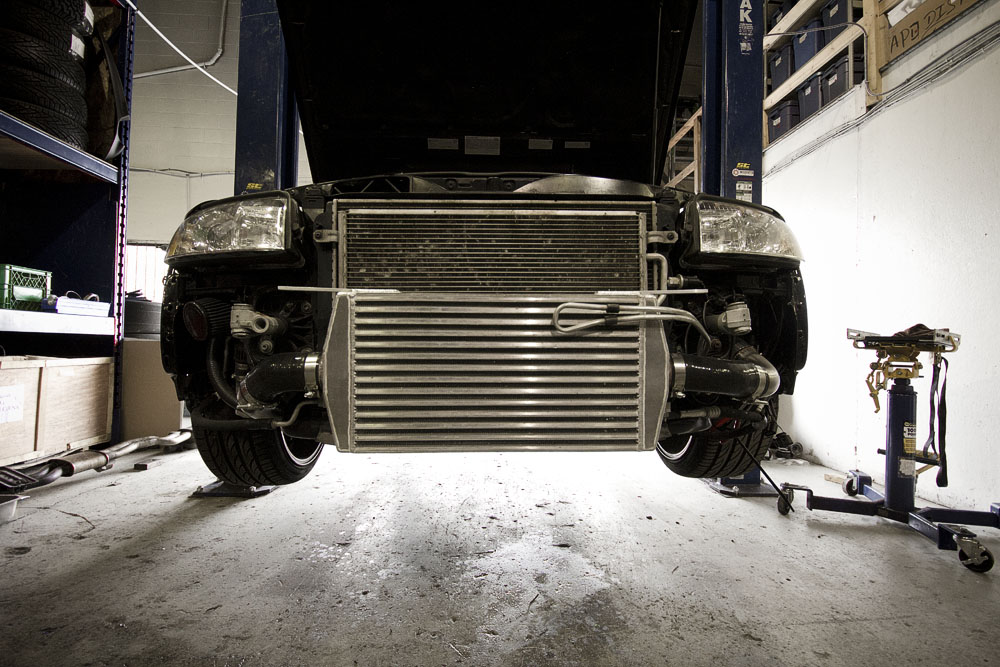How to Pick an Aftermarket Intercooler
So you have modified your Audi, BMW or Volkswagen a bit. Maybe tuned the ecu, added a cold air intake and some exhaust work. You start to hear “hey man you need to get a giant front mount intercooler to keep that thing cold.” But are still new to the modding scene and need to figure out what these intercoolers really are and do you really need one?
Intercoolers kinda give an idea what they are by just looking at their name. They help provide “cool” air to your car. Now without going total car nerd we will keep this simple.
If your car is turbocharged or supercharged you need to understand a few basic principles. Both of these forced induction systems as they are known pressurize the intake side of the engine. When you add more air and thus more fuel, you generally will get more power and torque. Sounds simple right?
Not really.
By compressing air, there is a drawback. Hot air. Compression causes the heating of the air going into the engine. But you just said more air = more power! I did. But the key is what type of air is going into the engine. As we talked about in our intro to cold air intakes post, we talk about how cold air is key to adding power. So if turbochargers or superchargers are blowing hot air into the engine why are they added?
Enter intercoolers.

To battle this hot air problem, engineers years ago developed intercooler systems which work in conjunction with the forced induction systems to cool that hot air down. By forcing this hot air through an intercooler system, the temp is reduced as is the air pressure from the restriction from the intercooler. The result? Cooler and more dense air charge. And when this dense air charge is combined with the proper amount of fuel you get some serious horsepower gains.
So how does an intercooler work really?
For the sense of brevity we are going to only talk about the air to air charge coolers found in the applications we cover.
In these setups the air is passed from the turbocharger or supercharger through a core which can be seen as a front mount or further back. As the air passes over the fins of the core, the heat is pulled from the air charge. Thus delivering cooler air to the engine.
Consistency is key when it comes to power at the track or on the street.
One of the most important things to understand about running an aftermarket intercooler is that by upgrading your stock intercooler you are delivering a system that not only will improve the cold air your engine sees from increasing the boost in your turbocharged/supercharged car but it will deliver consistent, reliable cool air.
Heat soak is the enemy of performance and is when you are pushing your car hard and no matter what that intercooler is unable to keep things cool. Stock intercoolers just cannot cut it when you start modding and/or tracking your car. By upgrading your OEM intercooler to an aftermarket option you ensure you keep things cool even in the toughest conditions.
So you are ready to pull the trigger on buying an aftermarket intercooler for your Audi, BMW or VW? Now what? One of the two main things you will see when comparison shopping intercoolers is style. Now there are some other options such as side mount intercoolers found on select model cars but for the sake of this article we will compare the two biggest differences:
Front Mount Intercooler
As the name implies this is when the intercooler is placed directly in front of your car within the bumper. Completely visible from the exterior of the car this is a popular option for those looking to also add an aggressive look to their car. The downfall of this setup is you can be restricted to the core size as it must fit within the measurements of the bumper. Smaller core means not as much ability to deliver cool air.
Direct OEM Replacement Intercoolers
These type of intercooler upgrades go in the same stock location as the OEM units. But offer an increased core size. The benefit of this is you are able to get the maximum amount of core in your car and generally these will outperform any FMIC competitor for the platform. One thing to note is not all direct OEM replacement intercoolers are drop and go from an installation standpoint. Some brands will require some trimming to get them to fit. But rest assured we at ModdedEuros.com always denote any additional installation needs on each product page.

Wanna learn more about intercoolers? Check out our review of the Unitronic MQB intercooler kit we run on our Project MK7 GTI!


